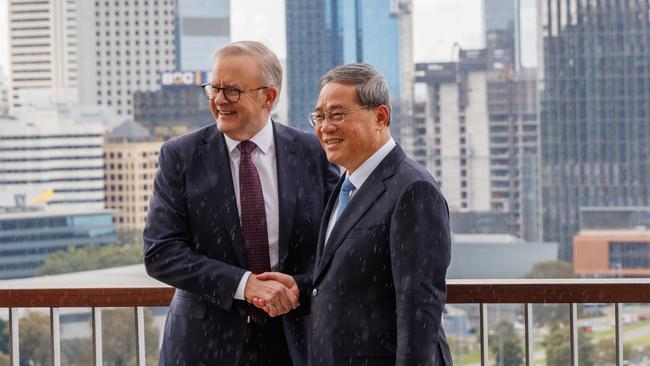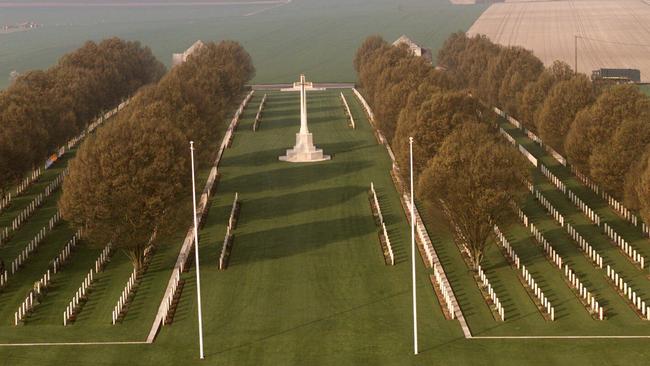Peta Credlin: Anthony Albanese not the man for the Australia’s most dangerous time in decades
Anthony Albanese is proving himself to be a weak prime minister and Australians are waking up to the fact, writes Peta Credlin.
Peta Credlin
Don't miss out on the headlines from Peta Credlin. Followed categories will be added to My News.
There are two possible explanations for the Prime Minister’s constant kowtow to China. Either he doesn’t think China is a threat to Australia and he’s at odds with the 71 per cent who tell pollsters that it’s “very” or “somewhat” likely that China will become a military threat to Australia; or he thinks that the best way to avoid conflict is to placate a bully, even though the only thing bullies respect is strength.
Either way, a prime minister who refused to say, last week, whether he’d raised with the Chinese premier the deliberate injuring of our naval personnel; and who refused to call out Chinese embassy attempts to block from view the Australian journalist, my Sky News colleague, Cheng Lei, who China had earlier unjustly imprisoned for three years, is hardly who you’d want running the country at this most dangerous time in decades.
Anthony Albanese is weak, and Australians are well and truly waking up to it.
The government’s refusal last year to send a frigate to protect freedom of navigation in the Red Sea was the first time under the ANZUS alliance that Australia has refused to meet an American request for military assistance. Labor might cite its commitment to AUKUS as proof of its seriousness about defence preparedness, but the AUKUS subs won’t be here for at least a decade; and in the meantime, the government is actually reducing our current naval strength with the premature retirement of at least one of our Anzac class frigates. Likewise, they’re not going ahead with earlier plans to put Tomahawk missiles on our existing subs, nor buy an extra squadron of F35 fighter jets. Rather than admit to pacifism, the government would prefer to tell our allies that we’d like to help but we can’t.

This “small Australia” stance is at odds with the fact that we are the world’s twelfth largest economy. And it jars with our entire history up til now. It’s worth remembering that when the Great War broke out, the then-Labor leader’s response was a pledge that Australia would stand behind her allies “to the last man and the last shilling”. Then again, Albanese’s reluctance to stand up for freedom has a worrying parallel with recent IPA research, in the wake of the Russian invasion of Ukraine, that – if faced with a similar foreign invasion – only 46 per cent of Australians would “stay and fight” and 28 per cent would seek to “leave the country”.
That’s so at odds with our instinct during two world wars. In the 1914-18 war, more than 400,000 Australians volunteered to fight (from a population under 5 million), 330,000 served overseas, 155,000 were wounded and 60,000 lie in war graves overseas. In Sir John Monash, the commander of the Australian Army Corps, we produced the “most resourceful general in the British army” who pioneered the combined arms warfare involving the close coordination of artillery, infantry, and tanks that finally broke the German army in 1918. In World War II, from a population of just over 7 million, almost a million were in uniform (including my grandfather) and 40,000 made the ultimate sacrifice.
I’ve just been on leave visiting some of the battlefields of northern France where five Australian divisions became the shock troops of the British army. It is something I have always wanted to do given my great-grandfather fought in WWI alongside five of his brothers and yet I knew so little of his military service. To visit the battlefields and walk among the dead was a truly moving experience, something every Australian should do if they can, and one of the most memorable trips of my life.

The inscriptions that families placed on the headstones of their dead loved ones show poignant expressions of loss and regret but also the patriotism and the stoicism of those times: “I’m all right mother, cheerio”, “there was his duty to be done and he did it”, and “his country called and honour bade him go”, were just some I photographed. And as I stood in the fields where still today, French farmers uncover the bodies of our men, I wondered aloud whether we were worthy of their sacrifice, whether we placed enough store in their defence of fundamentals like freedom of speech to defend it ourselves today; in short, would we ever see their like again?
Obviously, the Australia of today is very different from then, but our values and our patriotism should be impervious to the passage of time, but I think we all know they are under constant threat.
It was easy to assume after the break-up of the old Soviet Union, and the entry of China into the global economy, that “history had ended” with the permanent triumph of market economics and liberal democracy. But as we’ve discovered, not everyone was convinced of the need for individual freedom and national independence. September 11 was evidence, and October 7 confirmation, that apocalyptic Islamism was still set on “death to the infidels”. The Ukraine war shows the Russian dictator’s yearning to recreate his country’s old empire; while Beijing’s constant pressure against Taiwan is the next stage in the Chinese communist leadership’s oft-stated determination to become the top power by mid-century.
If the world is to stay free, fair and prosperous – it will only be because the main Western countries keep the strength and self-confidence needed to deter aggression; with Australia, too, doing its part. But that needs our political leaders ready to defend our values as much as it does young people ready to defend our country, as so many have before.
LIBERAL LEADER WILLING TO FIGHT
Peter Dutton’s readiness to make the next election a referendum on nuclear energy shows real leadership and will turn the next election into a serious contest to keep our country a first world economy that can still make things here. For too long, we’ve run our power system to reduce emissions rather keep electricity affordable and reliable. The trouble with wind and solar power is that it’s only cheap when the wind blows and the sun shines yet we need electricity 24/7.
Labor’s hysterical reaction shows that Dutton is on the right track. How can it be “dumb” to have nuclear power on land when we’re going to have it at sea; or “uneconomic” to have the nuclear power that’s used by nearly every other G20 country; or “unsafe” to have more reactors when we’ve safely operated one at Lucas Heights in suburban Sydney for 60 years; or “take too long” when Snowy 2.0 which was supposed to take five years and cost $2 billion is now taking at least ten years and cost at least $12 billion?
There is still more for the Coalition to do on renewables and the fact that they are destroying the economics of 24/7 baseload power. But, finally, we’ve got a Liberal leader willing to take the fight up to Labor. That’s been missing at a state level and that’s why almost all of them are stuck in opposition. At least federally, it’s game on!
More Coverage
Originally published as Peta Credlin: Anthony Albanese not the man for the Australia’s most dangerous time in decades





